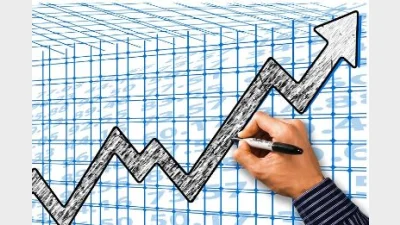Economist warns of rising recession risks as US tariffs threaten global growth



The era of “US exceptionalism” may be drawing to a close, with widespread implications for global markets, currencies, and interest rates, but the message from the super sector is funds remain well-positioned to weather the volatility.
In his latest assessment, AMP chief economist Shane Oliver said the growing backlash to Donald Trump’s aggressive wave of tariffs could trigger a global economic slowdown, elevate recession risks, and add pressure to non-US central banks to respond.
“The risk of a US recession was already rising,” Oliver said, pointing to depleted household savings, shaken confidence, and the economic impact of the new tariffs that amount to roughly US$600 billion or 2 per cent of the GDP.
As a result, Oliver now puts the risk of a recession in the world’s largest economy at 45 per cent, up from 40 per cent just last week.
“A rough estimate is that the hit to US growth will be at least 1 per cent, with a similar amount added to US inflation,” the chief economist said.
Globally, the economic consequences could be far-reaching.
“Global growth could be pushed towards 2 per cent from 3 per cent currently, depending on how significant retaliation is and how countries like China respond with policy stimulus,” Oliver said.
In China’s case, the 54 per cent average tariff rate could strip 2 percentage points from growth, with only limited mitigation from fiscal stimulus.
Australia is also feeling the shock. The Australian dollar plunged to a five-year low on Friday following Chinese retaliation, confirming its role as a “risk-off currency” that cushions the economy during global turmoil.
Still, Oliver estimated the direct hit to Australian GDP at 0.1–0.2 per cent, saying the real threat is a broader downturn in global demand, particularly across Asia.
“If we avoid retaliatory tariffs on US imports, as appears likely, and the $A doesn’t fall too far, Trump’s tariffs are more likely to hinder growth than boost inflation, supporting further RBA rate cuts,” he said.
“While the $A has fallen to a five-year low, it should be noted that it fell 39 per cent in the GFC and 19 per cent in the pandemic and yet the RBA still cut rates then because the threat to growth swamped any threat of higher inflation and the same will likely apply in response to Trump’s tariff shock.”
Meanwhile, equity markets are bracing for more volatility. On Monday, the Australian sharemarket experienced its biggest loss in five years as the global trade war escalated.
Last week, US shares fell 9.1 per cent, eurozone shares fell 8.1 per cent, Japanese shares fell 9 per cent, and Chinese shares fell 1.4 per cent. Locally, the sharemarket fell another 3.9 per cent, with the falls led by resources, IT, utilities, and retail shares.
From their February record highs, US shares are currently down some 17 per cent, global shares are down 16 per cent, and the Australian shares are down 15 per cent.
“Our assessment has been that global and Australian shares will have a 15 per cent plus correction measured from this year’s high. US shares have now had a 17 per cent fall but more weakness looks likely,” Oliver said, adding that while a 10 per cent fall in US shares was not enough to put pressure on Trump, the ongoing plunge likely will, at some point.
“Eventually, the Fed will likely respond with rate cuts, although this may be delayed given US tariffs will also add to US inflation. Lower share prices and a US pivot away from tariffs to more positive supply side policies will eventually create buying opportunities for investors, but there may be a way to go yet.”
ASX stocks vulnerable to US tariff shock
According to Morningstar’s latest note, for investors, the most pressing concern may be the exposure of ASX-listed companies to the North American market.
Morningstar analysts estimate that the top 20 Australian public companies generate around 10 per cent of their revenues in North America – far higher than the economy-wide export share – leaving equity markets more exposed to Trump’s tariffs than the broader economy.
Sectors facing the sharpest risks include basic materials, consumer cyclicals, industrials, and even some healthcare stocks with offshore manufacturing.
In contrast, defensive, domestically focused sectors such as utilities, consumer defensive, and real estate are expected to be more insulated, Morningstar said.
Super funds well-placed to ride out market volatility
In a statement on Monday, the Super Members Council (SMC) said: “Australians can be confident super is designed to deliver strong returns over the long-term despite cyclical ups and downs in the markets, under the stewardship of highly skilled investment experts”.
The council said that “only” $1 in $5 of Australians’ super is invested in the US, adding that any short-run declines in US markets should be viewed in the context of strong investment performance in the US over the last 10 years.
“We expect this week’s market falls will have little impact in 20 years – and beyond – when most of today’s super fund members will be starting to think about retiring,” said Matthew Linden, SMC’s executive general manager, strategy & insights.
“It’s natural for everyone to want to understand the impact of any market falls on their super balance, but it’s also crucial to remember super is designed as a long-term investment.”
Linden said that one risk is when people pull their money after a short-term market downturn, only to miss out on a recovery as markets rebound.
Recommended for you
Despite calming moves from the US administration and reassurances at the IMF and World Bank spring meetings, the global economy remains on a precarious footing, according to a new analysis by Barclays.
A former adviser to superannuation trustees has sounded the alarm on what he describes as “serious deficiencies” within the system, urging regulators to take immediate action.
The International Monetary Fund (IMF) has issued a sobering assessment of the global economic landscape in its latest World Economic Outlook, dramatically revised after Donald Trump’s 2 April announcement of sweeping tariff measures.
Growth from the listed company’s key businesses has propelled Generational Development Group to new milestones in the three months to 31 March.












